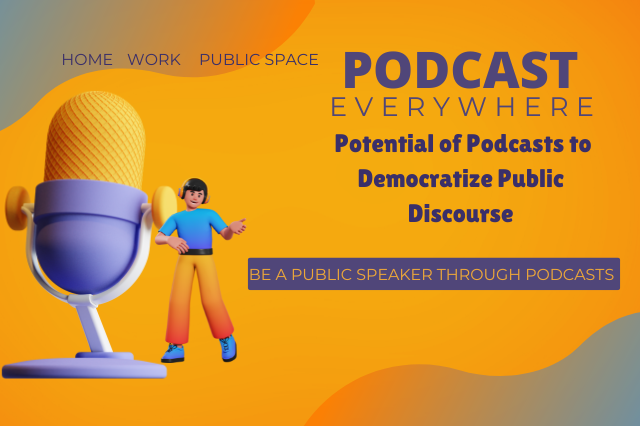Technology is made for our use and to make life better. Be it a knife or it is a computer, the purpose is to bring smartness and ease to the life of human beings. It depends on us to define the tools and technologies are good or useless and even dangerous.
There has always been an Open Door Policy for technology to enter the classrooms. Teachers, be it reluctant or passionate, all have ultimately adopted the approved ones. However, it is interesting to see what approves and how it gets accepted. There may be some selected people at the helm of affairs who do visits and meetings to prescribe technologies for the teachers and students. That is a policy task and done by the governemnt or organisations.
What role individuals play here? They bring in those technologies that stand the test of time because all of them come after being used as a personal pilot project in most cases. Podcasting in education - making EduPodcasts - since 2009-10 has been this type of misson for me. I did not do anything, it was the students who accepted and contributed to this beginning. Today, eduPodcasts and PodMOOCs are acknowledged areas in teaching-learning. All credit to the ones who took the flag high.
As a Public Speaker and teacher who has kept public speaking skills, communicative competence and creativity as foundation of all lesson, I have seen bringing feasible tech-tools to mainstream usage in my classes. It may be a university in the metro city or a school in the small city, it can be a university in a semi-urban area or a university in Uzbekistan - Podcasting has become the booster for teaching.
Podcasts have emerged as a powerful tool for democratizing public discourse, offering a platform for individuals from diverse backgrounds to share their perspectives and engage with a global audience. Unlike traditional media outlets, which often prioritize established voices and narratives, podcasts provide a space for marginalized communities and underrepresented viewpoints to be heard.
One of the key ways podcasts democratize public discourse is by allowing individuals to produce and distribute content independently. With the advent of affordable recording and editing software, anyone can create a podcast and share it online. This accessibility has led to a proliferation of podcasts covering a wide range of topics, from politics and current events to niche interests and personal stories. This diversity of content ensures that there is something for everyone, and that a variety of perspectives are being represented.
Podcasts, once a niche medium, have rapidly become a powerful tool for shaping public discourse. Their accessibility, affordability, and unique format offer a platform for diverse voices to be heard, potentially democratizing the way we engage with ideas and information.
One of the most significant advantages of podcasts is their accessibility. Unlike traditional media, such as television or radio, podcasts can be consumed on-demand, at any time and place. This flexibility allows for a wider range of individuals to engage with content, breaking down barriers based on location, time constraints, or socioeconomic status. Moreover, podcasts are relatively inexpensive to produce, making them a viable option for individuals and small organizations. This low barrier to entry encourages a diversity of voices and perspectives to enter the public conversation, challenging the dominance of mainstream media outlets.
Podcasts often foster a sense of community among their listeners. By providing a platform for intimate conversations and shared experiences, hosts can create a space where individuals feel connected and empowered to participate in public discourse. This sense of belonging can encourage listeners to engage with the content on a deeper level, leading to more thoughtful and informed discussions.
Furthermore, the interactive nature of podcasts can enhance audience engagement. Many hosts encourage listeners to share their thoughts and feedback through comments, social media, or email. This two-way communication can create a more dynamic and inclusive conversation, allowing for a wider range of perspectives to be considered.
Podcasts can play a crucial role in challenging mainstream narratives and providing alternative perspectives. People on podcasts are not recorded by a camera so they carry a sense of freedom from the eyes. It is an observed behaviour that the same person will be conscious and careful to keep his ideas controlled but can be liberal to bring enriching content. Here, we are only referring to those who have a sense of quality in their content. Those who only want atention and arguments around them, are not the 'influencers' we are talking about in the use of Podcasts.
By offering a platform for marginalized voices and independent journalists, podcasts can expose biases, hold power structures accountable, and promote critical thinking. This can help to democratize public discourse by ensuring that a variety of viewpoints are represented and considered.
we should not forget that while podcasts have the potential to democratize public discourse, it is important to acknowledge their limitations. One challenge is the potential for echo chambers to form, where listeners are only exposed to viewpoints that align with their own. This can limit the diversity of ideas and hinder productive dialogue. This is a threat to any technology that becomes public. On YouTube we can see that our intrests are aligned and we pick the content that is our type. This is natural but should not be a narrow lane because once we are with a mental lock, podcasts are not themselves strong enough to attract the 'non-attracted'.







